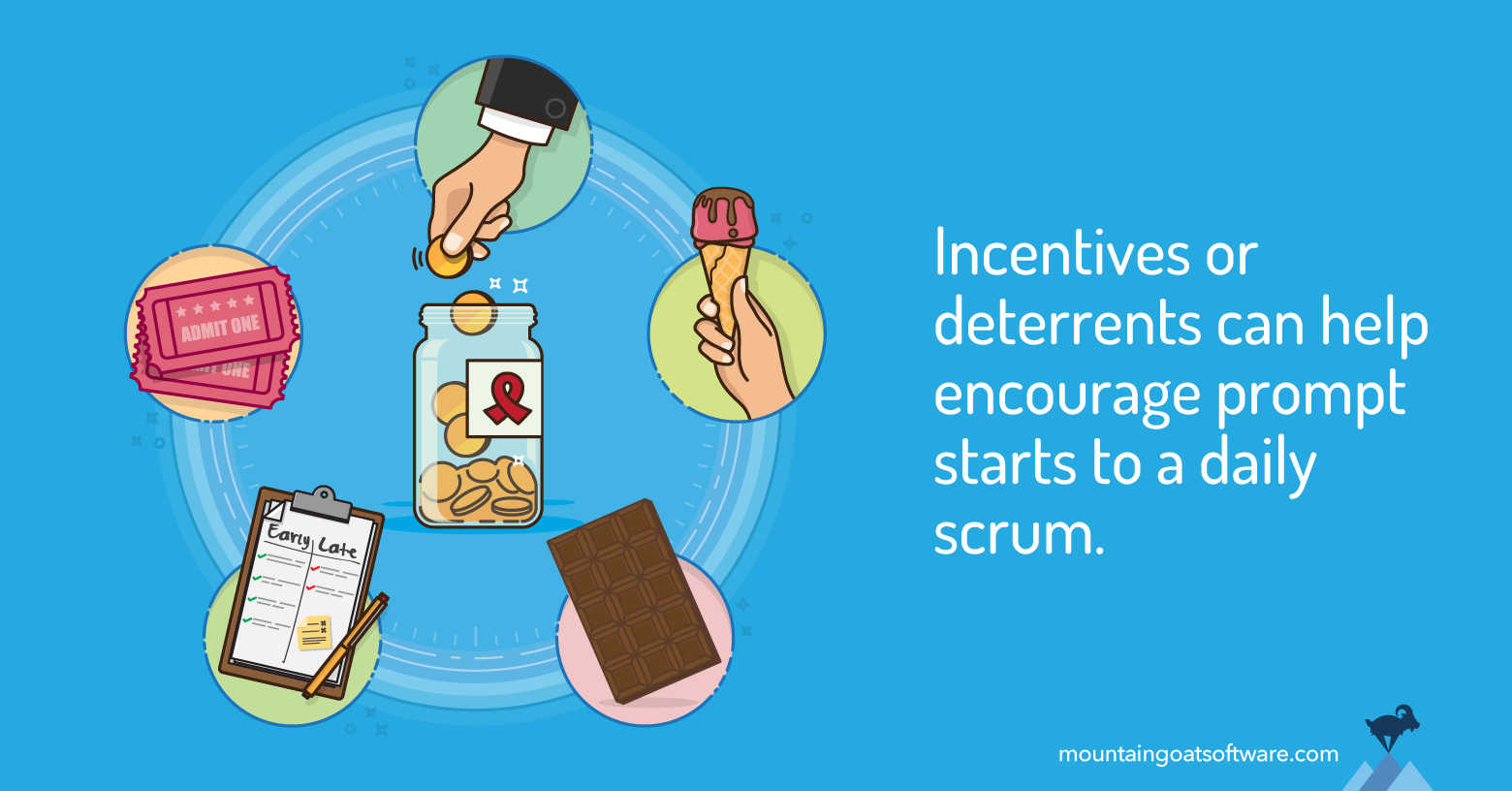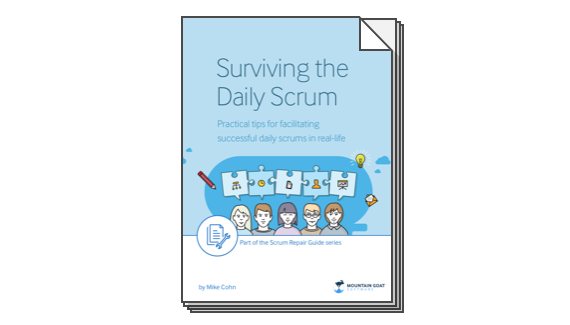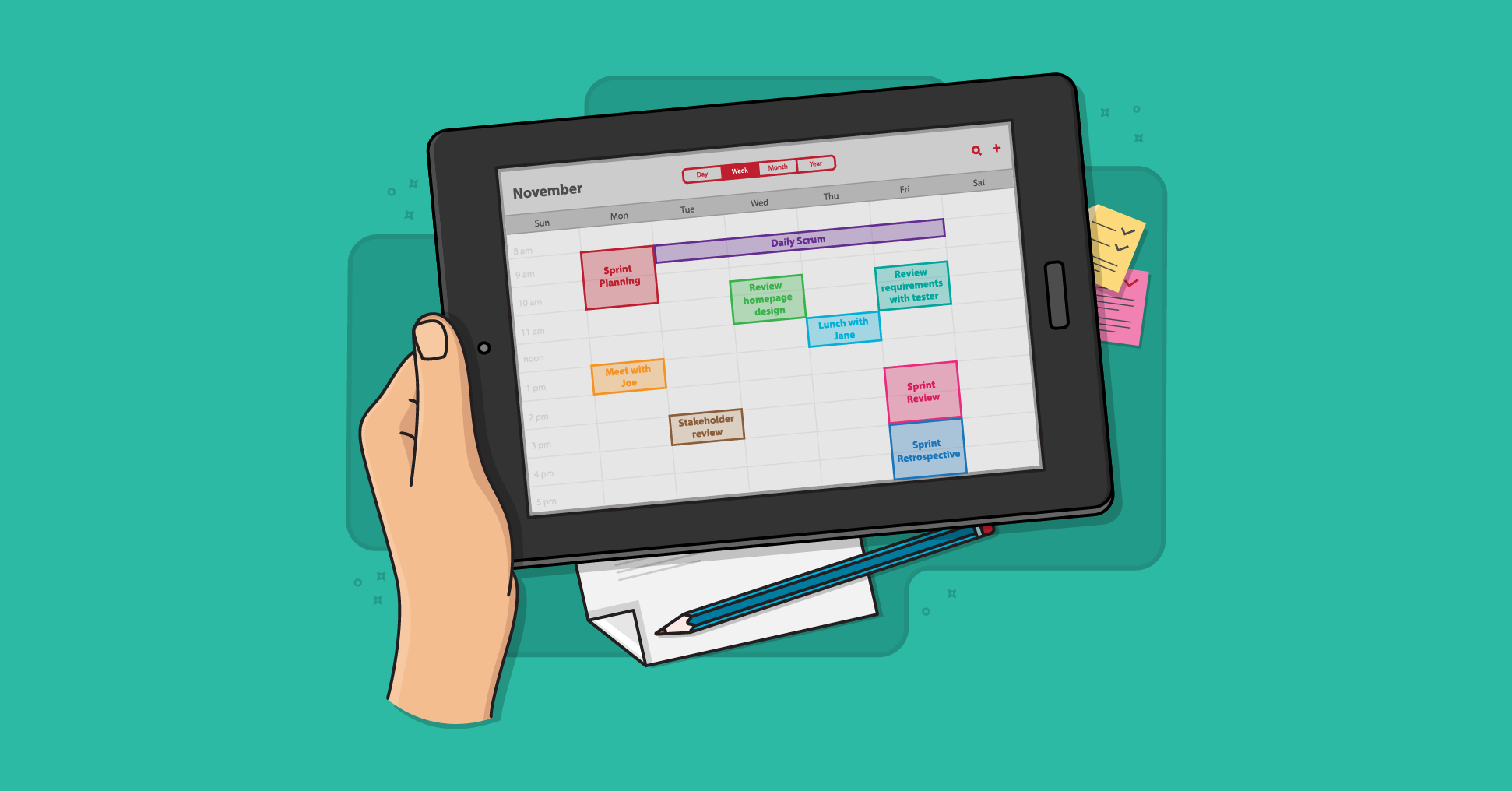I recently emailed everyone who subscribes to my weekly tips a list of suggestions for ways to motivate team members to arrive on time to the daily scrum. For example, many teams have a rule that if you arrive late, you put a dollar in a jar as punishment for being late. Ideally the collected money is donated to a charity at the end of a project or after it reaches a certain amount.
I included a number of other techniques I’ve seen Scrum Masters use. Many were similar to paying a dollar in that they were punishments for being late. Wow, did I get called out for that. The general argument was that a Scrum Master should use an incentive for being on time rather than a punishment for being late.
That’s a really good point. But I have to say that in the vast majority of teams I’ve seen, they use a punishment rather than an incentive. Many of the punishments involve at least the potential for embarrassing the offender--sing a song, do a pushup, tell a joke, etc.
I’ve thought about why this is. It may be because it’s more natural (for many of us?) to harass the one rule-breaker than reward everyone else. Or maybe it’s because embarrassing the late arriver by making that person sing (for example) is more fun for everyone else.
Incentives Rather than Punishments
I do think, though, that it’s a great suggestion that we look for incentives rather than punishments. Besides, punishment may be too strong of a term. I was told by a couple of people that deterrent might be the better term.
In fact, Rob Dull pointed out an underlying benefit to using a deterrent, saying, “It's sooo healthy for people to be able to be silly/awkward in front of their teammates.”
Others considered the entire idea “stupid,” as one email I received succinctly put it. While others pointed out that the only real fix is to tap into an intrinsic motivation to get latecomers to arrive on time.
Isaias Fritsch took that type of approach by preparing a 30-minute presentation for the team on the importance of the daily scrum. He said that after that presentation, the team decided to come up with some changes to their daily scrum approach. The result of this has been that “the daily scrum is now way more interesting to everyone because relevant information is shared and everyone understands its importance/why we are doing it.”
Ted Morris Dawson had an interesting take on the punishment vs. incentive idea. One technique he has used was if all team members are on time for all daily scrums, then it’s the Scrum Master who does the embarrassing thing like sing, tell a joke or so on. Yikes!
So with the idea that we can help teams overcome the problem through either deterrents or incentives, I’ve split the suggestions I was emailed into lists of each.
Deterrents
- Read a tongue-twister to the team (“Seventy-seven benevolent elephants” or “Scum-sucking scrum teams scrounge scrumptious scraps.”)
- Dance alone without music for five seconds. Rob Dull reported, “It's quick, amusing for everyone, and it's a healthy encouragement of vulnerability.”
- Bring coffee or a snack for the team the next day. Be careful--a few people emailed about gaining weight from this one! 😊
- Have a “tardy board” as Nadine Sullivan called it that tracks late arrivals or absences. Add rules like everyone is allowed one late arrival during some period. But after reaching some number of late arrivals or absences, the person has to bring something in such as a snack for the team.
- Toss a beach ball, stuffed animal or some other item to the person who is to speak next. Throw, don’t toss, it at any late arrivers.
- Buy the team an afternoon snack or tea.
- Present a 30-minute knowledge sharing session on a topic. This was pointed out as being particularly helpful in team building.
- Facilitate the next review or retrospective.
- Facilitate the next daily scrum, meaning everyone is waiting for tomorrow’s meeting to start if today’s late arriver is late again.
- Take detailed, precise notes for the meeting.
- Solve a tricky math problem on the board.
- Buy a book for the office library. How about one one my books? 😊
- Close the door. A late arriver has to open it to enter, which focuses attention on the person.
- Take on a short (perhaps 15-minute) administrative task the team needs done.
- Simply put an indicator to each person’s name on a wall to show how frequently each team member was late.
Incentives
- Reward the first people to arrive with small bits of chocolate.
- Collect a dollar or two for being late, but when the money is donated to a charity, donate it in the name of the person who arrived first at the meeting most often. Since charitable contributions are tax deductible in many countries, this gives incentives for being early and for not being late. Or as Michel Biron pointed out, it was both “carrot and stick.”
- Give everyone who was prompt for each daily scrum a reward like a two-hour lunch or permission to come in late and leave early one day.
- Everyone who was on time for each daily scrum goes to a movie during the day, one day during the next sprint.
- Establish a policy of “if one of us is late, we’re all late,” and then provide a significant team reward to everyone if everyone is on time. One person told me he did this, but extended it to include being on time for all meetings. He knew that it would be hard to do, so he needed a significant motivation and they agreed on a nice lunch paid for by the company. As a consolation prize, if team members were only on time 90 percent of the time, everyone would receive a chocolate bar.
I was told, “The result even surprised me. The team completely shifting their behavior. I was seeing team members loading up the digital agile board and setting up the conference connection for the remote team members minutes in advance of the standup. The team was holding each other accountable by friendly shoulder taps to make sure they all make it on time. I even observed a team member running across the building to grab someone out of a meeting to make sure she also makes it on time as well.” - Ice cream if everyone is on time every time.
- A photo of the team holding a sign saying: “We did it!”
- Start the meeting 15 minutes before everyone wants to go to lunch. Viktor Buzga reports that the company cafeteria in his company gets very crowded at 11:30 when it opens. Arrive at 11:30 and there’s no wait for lunch. Arrive two minutes later and there’s a 10-minute wait. So he starts daily scrums at 11:15. If the team finishes in 10-12 minutes, they’re perfectly timed for lunch. If not ...
So, there are many ways you can go about this. And, as I said in my emailed weekly tip, I love getting the chance to learn from all of you. I definitely learned some good techniques from this. Also, I’ve learned that I really should think more about incentives rather than deterrents.
Whatever you choose to do, you really need to make sure the entire team buys into it. The last thing you want is for someone to go to human resources complaining that you’re making him do a pushup for every minute he arrives late to a meeting.
But, for a team on which being late is a problem, these approaches can help address the problem. A common thread in many replies I received was that many of these incentives and deterrents work especially well because the entire team starts holding each other accountable. This is a huge benefit over just a Scrum Master holding people accountable.
Last update: June 25th, 2024









